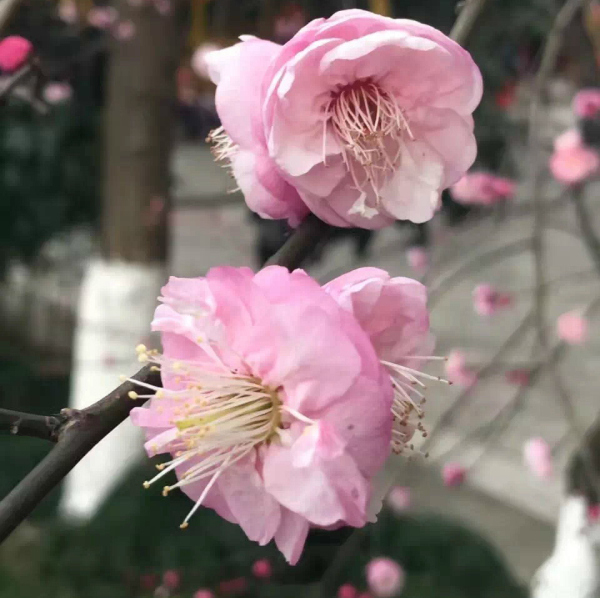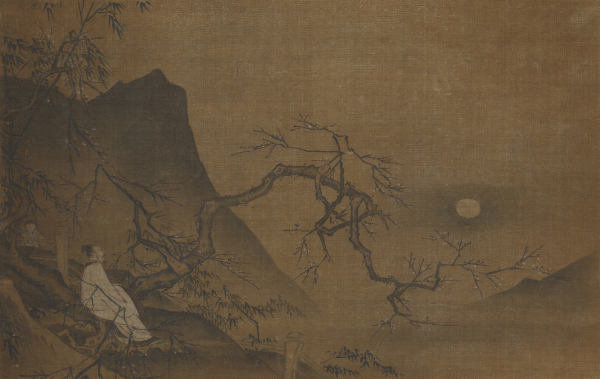
A view of plum flowers on the West Lake
With springtime setting in, it is the plum blossoms season again. In Hangzhou, the plum scenery in the lakeside Solitary Hill is second to none, taking into consideration all the literature, tales and legends related to the island with bridges connected to the lake banks. The best-known cultural figure is Northern Song literati Lin Hejing (967-1028), whose life story is crystallized in his alias "meiqi hezi", ("plum tree as wife and cranes as children"). The poet settled down in the hill to withdraw from society at the age of 40 and never left, living in solitude with the company of only plum trees and cranes. In his life in Hangzhou, he never set his foot in the city proper. Lin's most quoted verse lines are as follows:
"Dappled shadows hang aslant over clear shallow water; Secret fragrance wafts in the moonlit dusk."
In the eye of Lin Hejing, plum blossoms burst forth after all the other flowers faded into freezing cold, and thusly became the crown jewel of winter and "even made butterflies jealous".
"It takes a truly noble mind to appreciate the pride of the flowers. With the blossoms at the doorstep, I don't need any entertainment."
A lesser-known literal reference is a poem by Bai Juyi (772-846), written before Lin Hejing's most famous "plum blossoms" duet. In the poem, the Tang poet reminisced about his three years serving his duties as governor of Hangzhou and recalled how the company of his two friends and the plum blossoms healed his restless soul:
"I still remember the drinking sprees enjoyed in the intoxicating beauty of the plum blossoms in those three dull years...From the first day of the blossoming season, I couldn't take my eyes off the scene, until the last flower withered and fell..."
The poem, together with many others, also reveal why the Solitary Hill in Hangzhou was also called "Plum Islet". The plum scene of the hill was also continuously enriched by bustling religious activities throughout Sui (581-617) and Tang (618-907) years and the construction of a temporary imperial residence up in the hill in the Qing Dynasty (1644-1911).
Love is also one of the themes of the many legends and tales related to the seasonal beauty of the Solitary Hill.
More speculative sources claim Lin Hejing chose to live in seclusion after his heart was broken in a failed love. Another love tragedy is about Feng Xiaoqing, living in the Wanli years of the Ming Dynasty (1368-1644). Legend has it that the 16-year-old girl from Yangzhou fell in love with a man she met in Hangzhou. The romance of the two came to nothing because of the man's jealous wife. The suicidal girl left the man and rested in peace under the plum trees in the Solitary Hill.
The fans of the plum blossoms of the Solitary Hill also include Zhou Mi (1232-1298), born in present-day Huzhou. The Southern Song loyalist lived a hermit's life in his later years. One of his poems shows his obsession in the thawing snow scene of the Broken Bridge in Hangzhou.
"Riding a horse and chanting in the freezing cold of dusk, I was searching for the message of plum flowers. Someday, the snow will thaw and the sun will come out again, and the city will be bathed in the sweetness of spring...I saw a rowboat return in hazy twilight, fully loaded with poetic sentiments. Bleary-eyed, I headed home, feasting my eyes on beautiful waters and boats and overhearing the girls' small talks from the back yards in the east...The scene felt just like what Xie Lingyun saw in his dreams..."In one of his poems titled "Solitary Hill", Ming Dynasty poet Wang Siren (1574-1616) expressed his respect for Lin Hejing and his yearnings for a hermit's life just like Lin's.

Lin Hejing and Plum Flowers, a painting by Ma Yuan, Southern Song Dynasty
Zhang Dai (1597-1679), an outstanding representative of the Ming Dynasty man of letters, was such a big fan of Lin Hejing that he wrote what he claimed to be an epitaph for the man.
A special member in Lin's fan club is Xu Wei (1521-1593). The self-willed, wayward Ming dynasty painter, poet, writer and dramatist indulged in a dazed and self-destructive lifestyle till his last day. In one of his poems, he depicted the imaginary scene of himself and Lin Hejing sitting under the moonlit plum trees and surrounded by a houseful of friends and guests.
The poems of Ming Dynasty poet Zhuo Jing, born in present-day Rui'an in Wenzhou, show the man's romanticism and imagination went a bit too far. In one of his poems, he depicted an unlikely scene of someone planting plum trees at midnight in the formidable cold of the West Lake.
For the Ming Dynasty poet Chen He (1516-1560), the plum blossoms of the Solitary Hill brought more relaxed joy than melancholy and loneliness, as shown in one of his verses dedicated to the hill's floral beauty.
The plum blossoms of the hill enchanted Chen Xigu (1634-1687) so much that the man recalled the scene with genuine affection many years after he left Hangzhou.





